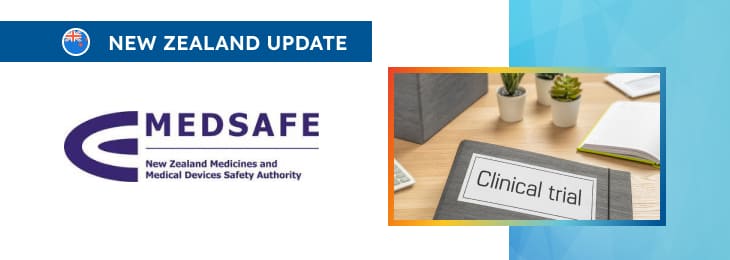The article highlights the key points related to the regulatory requirements for clinical trials in New Zealand.

Table of content
The New Zealand Medicines and Medical Devices Safety Authority (Medsafe), a country’s regulating agency in the sphere of healthcare products, has published a guidance document dedicated to various aspects associated with medical devices intended to be marketed and used in the country. In particular, the document addresses the matters related to clinical trials to be conducted in order to assess the actual effectiveness and safety of medical devices before placing them on the market.
The document provides an overview of the applicable regulatory requirements, as well as additional clarifications and recommendations to be taken into consideration by medical device manufacturers, study sponsors, and other parties involved in order to ensure compliance. At the same time, the authority reserves the right to make changes to the guidance and recommendations provided, should such changes be reasonably necessary to reflect corresponding amendments to the underlying legislation.
This document provides detailed guidance on the regulatory approval process and good clinical practice (GCP) requirements for clinical trials conducted in New Zealand. It serves as a comprehensive reference for understanding the legislative framework and procedural steps necessary to conduct clinical trials in compliance with New Zealand’s regulatory standards.
Overview of Relevant Legislation
The first section of the guidance outlines the key legislative instruments and additional guidelines that must be considered when conducting clinical trials in New Zealand. According to the document, the Medicines Act 1981 is the primary legal framework governing the regulation of therapeutic products, including clinical trials.
It is supported by the Medicines Regulations 1984, the Misuse of Drugs Act 1975, and other relevant laws.
Key Provisions Under the Medicines Act 1981:
- Section 30: Requires approval from the Director-General of Health for clinical trials involving new medicines.
- Section 20: Stipulates the need for Ministerial consent before distributing new medicines.
- Section 3: Defines essential terms like “medicine”, “new medicine”, and “therapeutic purpose”.
- Section 47: Addresses the storage and delivery of medicines.
- Section 88: Covers the refusal of a license by the licensing authority.
Other critical pieces of legislation include the Misuse of Drugs Act 1975, Privacy Act 1993, and Hazardous Substances and New Organisms Act 1996. These laws provide further regulatory controls, especially concerning controlled drugs, privacy issues, and the use of genetically modified organisms in clinical trials.
The document also mentions additional guidance documents that complement the legislative framework, offering detailed instructions on good clinical practice, risk management in early-phase trials, and ethical considerations. These include the Guideline for Good Clinical Practice E6(R2) and the National Ethics Advisory Committee Ethical Guidelines for Intervention Studies.

Overview of Regulation of Clinical Trials in New Zealand
Under the general rule, clinical trials involving new medicines must receive approval from the Director-General of Health under Section 30 of the Medicines Act 1981. Medsafe, the medicines and medical devices regulatory authority in New Zealand oversees this approval process.
The Health and Disability Ethics Committees (HDECs) also play a crucial role in granting ethical approval for all clinical trials conducted in the country. Furthermore, all clinical trials in New Zealand are expected to adhere to internationally accepted GCP standards as outlined by the European Medicines Agency (EMA).
While the CHMP GCP guideline (EMA/CHMP/ICH/135/95) forms the basis of these standards, New Zealand-specific modifications may apply, especially where there is a conflict with the Medicines Act.
Defining a Clinical Trial
In New Zealand, the definition of a clinical trial aligns with the CHMP GCP guideline, which describes it as any investigation involving human subjects intended to discover or verify the effects of an investigational product, identify adverse reactions, or study the product’s pharmacokinetics. The terms “clinical trial” and “clinical study”, as well as “investigational medicine” and “investigational product”, are used interchangeably.
Approval Requirements for Clinical Trials
Approval is mandatory for clinical trials involving new medicines, defined as those without Ministerial consent for distribution in New Zealand. This includes trials for new chemical or biological entities, unapproved formulations, or strengths of already approved medicines.
However, trials involving only approved medicines, placebos, or non-interventional observational studies do not require Section 30 approval.
Other Legislative Requirements
Clinical trials must comply with additional legislative requirements depending on the nature of the trial. For instance, trials involving new organisms must adhere to the Hazardous Substances and New Organisms Act 1996, while those involving controlled drugs must comply with the Misuse of Drugs Act 1975.
Health and Disability Ethics Committees Approval
As further stated by the authority, all clinical trials conducted in New Zealand must receive approval from an HDEC, regardless of whether they require Section 30 approval under the Medicines Act. This process is independent of Medsafe’s regulatory approval, and applicants can seek ethical approval at any stage during the trial’s approval process.
Advocacy Services
In accordance with the Health and Disability Services Commissioners Code of Rights, participants in clinical trials must be informed of their right to access advocacy services. While appointing a patient advocate is not mandatory, sponsors must ensure that participants know how to obtain these services if needed.
Conclusion
In summary, the present document provides an in-depth overview of the regulatory framework for the design, approval, and conduct of clinical trials in New Zealand. It ensures that trials are conducted under a robust regulatory framework that prioritizes safety, ethics, and compliance with both national and international standards.
How Can RegDesk Help?
RegDesk is an AI-powered Regulatory Information Management System that provides medical device companies with regulatory intelligence for over 120 markets worldwide. It can help you prepare and publish global applications, manage standards, run change assessments, and obtain real-time alerts on regulatory changes through a centralized platform. Global expansion has never been this simple.

